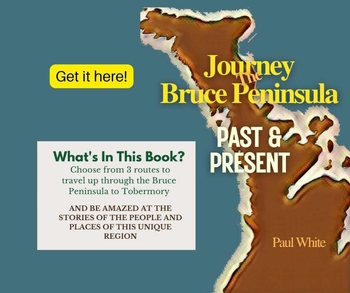Census Takers in
1891 Canada
Census Takers in 1891 Canada faced difficult obstacles to gather the necessary information but the results were revealing then, and today.
I never cease to be surprised by the historic documents which cross my desk at the Grey County Archives. Recently Marg Capel of Owen Sound brought some documents pertaining to the family of S.J. Parker to my attention. Amongst these papers was an interesting article about the 1891 Census in Canada.
Census takers did not have an easy task in late nineteenth-century Canada. In England the 1891 census was carried out by 40,000 enumerators in two days. In India where the population totaled 284,750,000 people an army of 1,000,000 enumerators performed the daunting task in a mere 25 days.
But in Canada with a relatively small population it took 4,300 census takers several months to arrive at conclusive numbers.
What was the reason for the long period required to count the people of Canada! In a word, GEOGRAPHY!
Canadian Census Takers Face Difficult Obstacles and Hard Choices
On the coast of British Columbia, a steamer was hired, and a team of enumerators sailed from Vancouver stopping at every inlet and island until they reached the border of the state of Alaska. Pack trains traversed the mountains and valleys of the Rocky Mountains.
Teams of dog sleds pulled enumerators through the snow of Saskatchewan. Canoe expeditions took enumerators to the far reaches of northern Ontario and Quebec.
In Manitoba enumerators searched out Canadians on horseback. In one instance a Manitoba enumerator got lost and to save himself from starvation he was forced to eat his horse!
In 1881, the demand to quickly determine the population of the young country was so great that Canadian government officials decided to estimate the numbers. However, in 1891, the demand made of the census takers was for accuracy. The results of this arduous task are interesting!
In 1891, the largest city in Canada was Montreal with a population of 216,650. Toronto held down second place with 181,220. Quebec and Hamilton were third and fourth with populations of 63,000 and 48,980 respectively.
Owen Sound, with a population of 7,497, was the 32nd largest community in Canada. The Scenic City was one place ahead of Berlin (now Kitchener), three ahead of Cornwall, four in front of Sarnia, and six ahead of Fredericton, New Brunswick.
Other western Ontario region communities with more than 1,500 residents included Collingwood (4,940); Walkerton (3,061); Orangeville (2,952); Kincardine (2,631); Mount Forest (2,214); Meaford (1,999); Wiarton (1,984); and Port Elgin (1,659).
Owen Sound's rate of growth exceeded the national average with an increase of 69.5 per cent from a population of 4,426 to 7,497. The reason for this incredible population expansion rate was due in large part to the Canadian Pacific Railway company establishing its eastern Great Lakes terminus for its fleet of steamers in Owen Sound.
The early census takers may have had an arduous task performing their duties in most of our country, but today researchers are rewarded by their efforts with a wealth of information about the formative years of this nation.
A version of this article first appeared in my Local History column in the Owen Sound Sun Times on January 12, 2001.
History Pages
Baseball History in Southwestern Ontario is rich, and surprisingly longer than one might expect, actually setting historical precedents!
Census Takers in 1891 Canada faced difficult obstacles to gather the necessary information but the results were revealing then, and today.
The Glorious Twelfth: A Tradition from Across the Pond which served to both unite and divide pioneer communities.
Maple Syrup: A Pioneer Necessity and a trading commodity for indigenous peoples is now a Sunday morning breakfast treat with pancakes!
Paris Ontario: Who Knew this community had such a unique origin and how the local citizens used that history to protect the environment of their region?
Pioneer Christmas: A Family Tradition as told to me by may grandparents who experienced Christmas as children in the 1880s and 1890s.
"Thank You to a Veteran" - should be something everyone of us should think, and especially say, every day!
From Lochnaw to Manitoulin - A Review this book details through a soldier's diary a trip from Penetanguishene to Manitoulin Island in 1839.
Baseball History in southwestern Ontario has very early beginnings and the dominance of Canadian teams in early competition may be surprising to many readers.
History Pages introduces the readers to interesting people, places, and events that I have researched and written about in my writing career that spans more than three decades.





